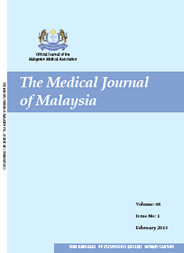MJM, Vol 70 Supplement 1 September 2015
Food eating habits and abdominal obesity among
Malaysian adults: Findings from Malaysian Adult Nutrition Survey (MANS) 2014
*Institute for Public Health, Ministry of Health, **Oral Health Division, Ministry of Health
ABSTRACT:
Introduction: Abdominal obesity is a strong predictor of development of many chronic diseases such as Type 2 diabetes. Persistent inappropriate food eating habits can lead to obesity, including abdominal obesity. The aim of this study is to investigate the waist circumference (WC) mean difference across various food eating habits among Malaysian adults.
Method: MANS 2014 utilised a cross-sectional study design with a multistage stratified sampling technique, targeting a total of 4,044 adults aged 18 and above. 2,878 respondents consisting of 1346 adult males and 1532 adult females were agreeable and responded to the questionnaire administered via face-to-face interview. The questionnaire touched on habits such as drinking water and eating fruits, with chewing times during meals. Data analysis was done using SPSS version 20.0. Age and ethnicity of the respondents were adjusted for by ANCOVA analysis.
Results: The tests showed that food consumption habits were associated with a WC increase in females compared to males. There was significant increase of WC with fruits consumption for males (p value <0.05; WC: 85.65 ± 11.97) while in females, there was a significant increase of WC for drinking (p value <0.05; 83.24 ± 11.88), fruit consumption (p value < 0.05; 82.73 ± 12.44) and chewing habits (p value < 0.05; 81.89 ± 12.28). After age and ethnicity were adjusted for, WC was still significantly increased in female respondents for all criteria (p value < 0.05).
Conclusion: WC increases from normal to abnormal for female adults who practice unhealthy food eating habits during meals. With females having an increased WC due to unhealthy consumption habits, the relevant authorities are urged to promote awareness and educate Malaysian women on better and healthier lifestyles.
